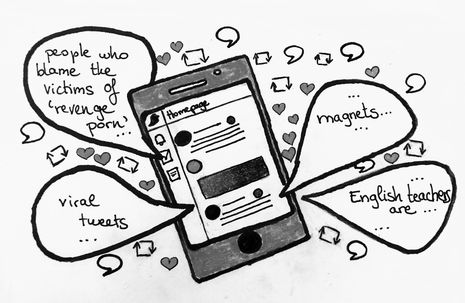The vacuous algorithm behind ‘going viral’
Writing on her own Twitter experience, Bella Biddle critically analyses an algorithm where memes, activism and hate speech are all equally spotlighted

I was 15 when my first tweet went viral. It was a pithy, acerbic take that parodied people who blame the victims of ‘revenge porn’ rather than those who distribute it, and it was neither particularly ground-breaking nor particularly original. My account was small and very teenage – at the time I was knee deep in a goth phase and was lucky if my angst-ridden musings got more than a handful of likes. Everyone who interacted with my social media feed was known to me, either in my real life or in the small corner of cyberspace I had carved out for myself; their profile pictures were familiar to me and their demeanour was usually kind.
Within an hour more than 55,000 people had liked my tweet, and just under 48,000 had retweeted it. Buzzfeed and Cosmopolitan lifted the content for their social media feeds, Jordan Peterson had openly condemned me, and a small but dedicated circle of paedophiles started searching for my hypothetical internet nudes. When I had composed my tweet I could not have known that over 6 years later I would still occasionally meet people who remembered me as ‘the nudes girl’, less even that someone I was seeing would find and send me screenshots of my face attached to my adolescent words. I could not have foreseen, and therefore was totally unequipped to cope with, the strange trajectory that took me into digital circles of celebrities and news outlets, and simultaneously into the hands of people who would use their words to proverbially rip me apart. I did not anticipate the extent to which I would be threatened, ridiculed, praised and seen as a result of that single tweet. If I had, I probably would not have published it.
“I did not anticipate the extent to which I would be threatened, ridiculed, praised and seen as a result of that single tweet”
Earlier this month, Katie Hopkins had her Twitter account permanently suspended for violating the platform’s “hateful conduct” policy, after she compared rugby player Ashton Hewitt’s genitalia to a baboon’s. Her Twitter served as a constant platform of vitriol, ignorance, and prejudice, and existed not only to appease her extremist right-wing follower demographic, but also to provoke outrage from those who disagreed with her. The Guardian, MTV, and Huffington Post have all described her as a ‘professional troll’, implying that she thrived more off the negative attention her violently offensive opinions received than she did off the small number of followers who agreed with her. Her entire career was launched off the back of infamy and notoriety; it was significantly easier for her to provoke the kind of engagement the Twitter algorithm rewards with an extremist and ill-informed take than it would have been for her to create any kind of nuanced, or balanced, discussion.
Currently all mainstream social media sites, including Twitter, organise our feeds based on the content we are most likely to engage with. They do not distinguish between content we support and content we condemn, but rather mathematically calculate the content’s perceived merit based on its number of likes, retweets and comments. This system, one where views breed views, has allowed grassroots social justice movements such as Black Lives Matter and #metoo to gain traction, expand and adapt. That said, this model is based on an algorithm that prioritises the content which is the easiest to engage with - often single facet one liners which provoke a visceral, emotional response. As often as not, this response is either harmless or positive - laughter, or empathy, outrage at a flawed system. It is radical that we live in a world where we are able to voice opinions and publish content without the typical barriers to platforming yourself on mainstream media. That said, Katie Hopkins’ online popularity was constructed not because she was likeable, intelligent or ground-breaking, but rather because it was so easy to respond with an instantaneous disgusted reply.
“Meanwhile, loudmouthed fascists with no education in the subjects on which they speak are able to curate huge followings”
My first viral tweet was about nudes, my second about magnets, and my third about English teachers. These arbitrary and unpredictable moments in the limelight have afforded me opportunities which my credentials obviously do not deserve, and have equally placed me in situations where I was made more visible than I intended, occasionally at the expense of my safety. Meanwhile, loudmouthed fascists with no education in the subjects on which they speak are able to curate huge followings, excused by a flawed system which turns a blind eye so long as they continue to create enough digital footfall, and thus revenue for the platform. Trends such as the black square on an Instagram feed for #blackouttuesday, exist with significantly more interaction than lots of the petitions, campaigns, and nuanced educative pieces created by individuals because they are both easier to engage with and produce.
Not all content online needs to be honed and perfected. There is absolutely still space for teenage angst, bad drawings, and perhaps even ill-informed opinions. That said, when content is promoted to us by algorithms which seem to promote both random and malicious content, we have to understand that the content we are being shown is often not the content which most deserves to be seen.
Whilst Twitter has finally banned Katie Hopkins, in an important stand against hate speech, we have to acknowledge that she has enjoyed a long career enabled by the platform. Whilst the internet creates a wealth of content for us, we need to be conscientious consumers, even when the content is free and packaged as casual tweets. We need to curiously seek out the quality content that creators post and interact with them uninhibitedly. We need to share causes that matter, and vitally, we need to ignore, report, and block those who seek to disseminate hatred and prejudice. If Twitter runs a system which popularises noise, then we need to use our voices to amplify what matters. Currently, not all those who speak loudest there deserve to be heard.
 News / SU reluctantly registers controversial women’s soc18 December 2025
News / SU reluctantly registers controversial women’s soc18 December 2025 Features / Should I stay or should I go? Cambridge students and alumni reflect on how their memories stay with them15 December 2025
Features / Should I stay or should I go? Cambridge students and alumni reflect on how their memories stay with them15 December 2025 News / Dons warn PM about Vet School closure16 December 2025
News / Dons warn PM about Vet School closure16 December 2025 News / Cambridge study finds students learn better with notes than AI13 December 2025
News / Cambridge study finds students learn better with notes than AI13 December 2025 News / CUP announces funding scheme for under-represented academics19 December 2025
News / CUP announces funding scheme for under-represented academics19 December 2025









